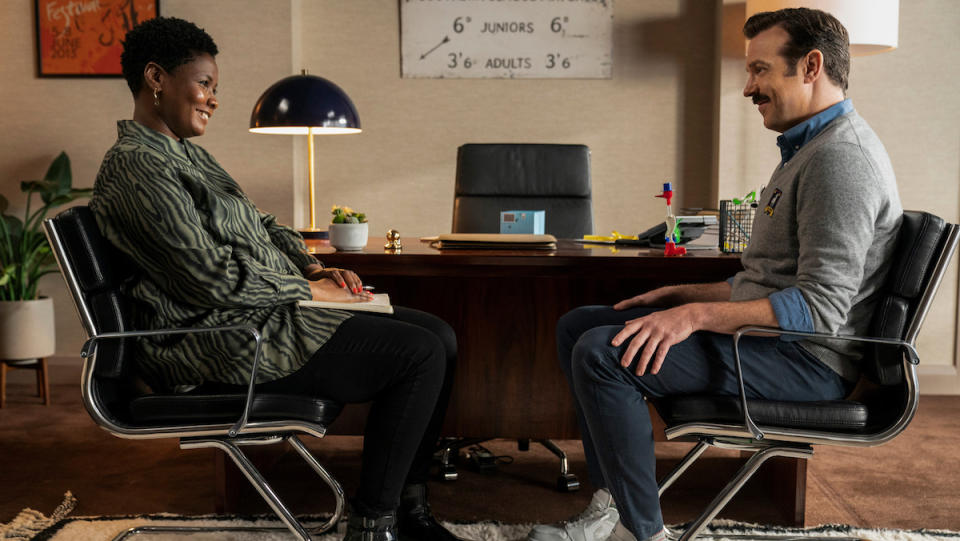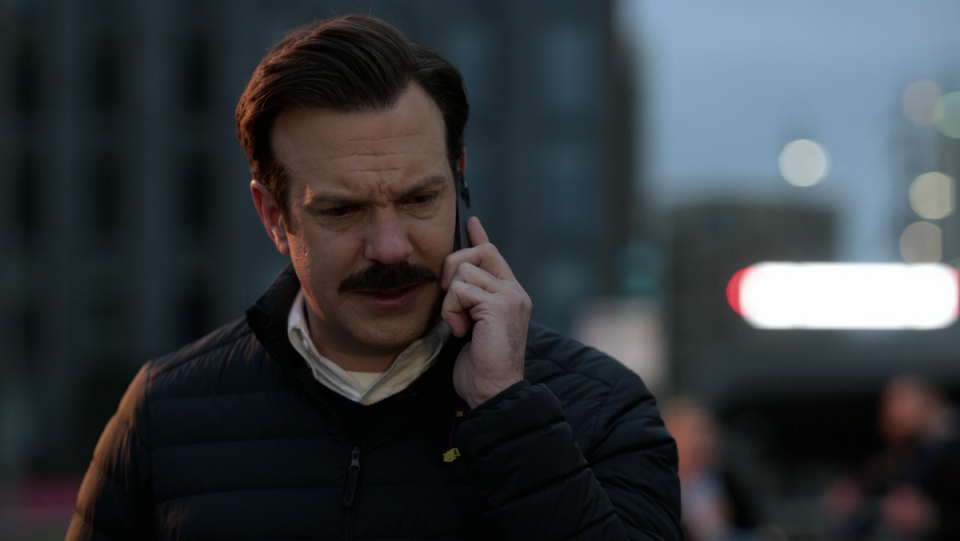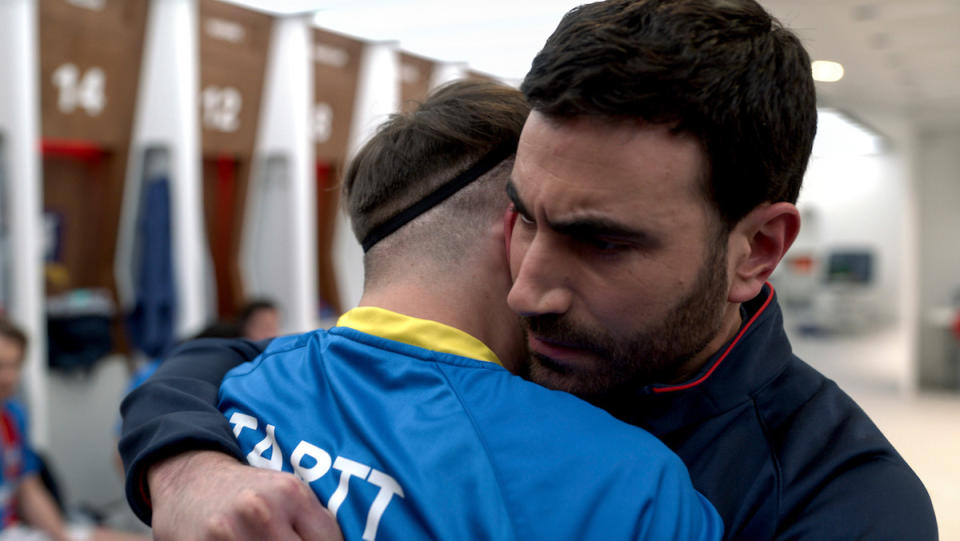TED LASSO Takes a Big Swing in Therapy-Centered Season Two
In the throes of the first pandemic autumn, Ted Lasso made quite a splash. After a more subdued release, whispers of this joyous, sincere sitcom spread like wildfire. Suddenly it showed up everywhere. By the time the Apple TV+ series returned for season two in July, it premiered as a much talked about, award-winning juggernaut, with 20 brand new Emmy nominations. Which is why season two’s surprising opening scene, in which Danny Rojas accidentally killed a dog, felt so jolting. It opened the gateway to a darker, more tumultuous season two.
It’s a bold move for the series to shift gears. Especially for as warm and spirited as Ted Lasso is. It’s certainly divided its energetic fan base. But while this season in particular isn’t clicking with everyone, I’ve found it incredibly watchable. One of Ted Lasso’s most compelling storylines in season two is how it talks about mental health. It’s both striking for a sitcom and a piece of sports-centered media.

Many, including myself, lauded Ted Lasso for its optimism and positivity after its debut. It brought a sense of warmth and levity that people really latched onto. But that’s not to say the darkness hasn’t always been there, bubbling under the surface. Season two moves the mental health conversation teased in season one forward with the arrival of Dr. Sharon Fieldstone. The aforementioned opening scene, in which a penalty kick leads to a tragic accident, results in AFC Richmond hiring Sharon to help Dani Rojas through a rough patch. She stays for the season as the players seek her out for their own needs.
Toheeb Jimoh, who plays Richmond’s rising star Sam Obisanya, commended the decision to put mental health at the forefront of the season. “What do you do when you’re a 20 something year old kid and the whole world is watching you? People bet on your performance, whatever. Regardless of work, being a footballer, their personal lives, all of them, some of them are away from home, they’re really trying to come into themselves,” he told Nerdist via Webex.
“I think it’s just genius from the creative team to have a group of young, confident, strong young men have to wrestle with their vulnerability. It’s something that people never speak about. You look at young athletes and you just expect them to have that idea of what a man is supposed to be, that kind of toxic idea of strong: ‘You’ve got it all, don’t worry about your feelings, just go out there and perform.’ But now, they really have to reckon with it.”
Ted Lasso’s mental health-focused journey comes at a particularly momentous time in the world of professional sports. Professional athletes all over the world are putting their mental health first, from Naomi Osaka and Simone Biles to Kevin Love and Marcus Rashford. And Jimoh’s thoughts on what the series is trying to depict get at a side of professional sports that the public often dismisses. The public that often sees athletes (and coaches) as commodities and not people.
The 12-episode second season’s been more of a slow burn, unfolding carefully. It’s all built towards the super-sized episode eight, “Man City,” in which so many of the show’s long-gestating storylines come to a head. Many fans have found the slow build frustrating. But it’s also allowed the show to dive into its supporting characters more, as we slowly get into what exactly is going on with the sitcom’s titular coach. It’s been a little refreshing to see Ted Lasso dive deeper into its character roster, even if it means some of the episodic conflict has been lighter as the season progresses.

Apple TV+
In season one, we see flashes of what’s beneath Ted’s bubbling, optimistic fa?ade. And it’s someone who is clearly struggling. We largely see it through the lens of his divorce, which culminates in his panic attack at the karaoke bar. But this singular event barely scratches the surface with what’s really going on with Ted. In fact, it’s something that specifically comes to a head in season two when faced with a psychologist colleague. Specifically, season two delves into the inner turmoil of two of the show’s (seemingly) cheeriest characters: Ted Lasso and Nate Shelley.
Nate’s unraveling is certainly an interesting twist—although not entirely out of place as we see his storyline unfold. Season one featured him as a cheery underdog, lacking confidence but possessing much knowledge, which Ted and Beard encouraged. But a new coaching position, which seems threatened when Roy Kent joins the staff, quickly sends him off the edge. Specifically, his roasts, which earned him so many fans, flip from sharply funny to downright cruel. Plus his treatment of Charlie, the replacement kitman, is downright hostile. As Nick Mohammed told New York magazine’s Vulture, watching season two is like seeing him “break down in real time.”
Meanwhile, Sharon’s arrival is jolting for Ted. His charm and goofy quips don’t have the same effect on her. She sees them for what they really are: a coping mechanism to avoid difficult situations or to keep himself at arms length. During the first several episodes, she looms in the background. She haunts Ted as she treats his players and seemingly ingratiates herself into the club. He evades any conversation that conveys honesty. Even after another panic attack—this one resulting in his early departure from a game—brings him to her office, he struggles to open up. And, in fact, he lashes out at Sharon and her profession as a whole in early sessions.

Apple TV+
It’s a frustrating look for the protagonist, to see his usually open, earnest mind so closed off—and callously at that. His usual methods of deflection fail, because Sharon, a trained psychologist, sees through the act. And so he lashes out. He mocks Sharon’s chosen profession and belittles her capacity for compassion because she gets paid to talk to people about their problems. He’s obviously deflecting, this time using a new, purposefully hurtful method. But Sharon isn’t just a TV therapist who exists to treat characters, be stern, and disappear into the ether. Still, she—and the series—don’t let Ted off the hook for his behavior.
Sarah Niles, who plays Sharon, deftly balances the psychologist’s professional stoicism while maintaining warmth when talking to her clients. And Sharon respectfully taking Ted to task presents a level of honesty that finally starts breaking through. She later cracks on even further, in a concussed state following her bike accident, no less. During one of their many check-ins post accident, Sharon shares her feelings and when Ted starts a pep talk, she quickly interjects. Ted’s a fixer, always jumping in to solve a problem—even if it’s not what someone needs. It’s what makes him such an empathetic coach, but it’s also a fatal flaw for him personally. One could say helping others through their difficulties is the perfect way to avoid his own struggles. But sometimes, as Sharon points out, people just need someone to listen.
“Man City” ends with Ted disclosing to Sharon the source of his deep-rooted pain. And, as some viewers probably suspect, it’s related to his father, more specifically his father’s sudden death. The father-son dynamic is central to the show. (The dynamic is famously a theme co-creator Bill Lawrence loves to explore on his shows.) It’s why Ted is particularly troubled by, and invested in, the fractured relationship between Jamie Tartt and his cruel dad.

Apple TV+
With a handful of episodes remaining, I’m interested to see how season two wraps up. I, of course, have my theories, as the episodes are building toward some sort of resolution while, naturally, leaving threads open for season three. Nate’s descent into cruelty is not pretty. With eight episodes down, and no end in sight, it’s unclear whether season two will bring the formerly-lovable character back down to earth.
I don’t know with certainty where the series will go with Ted’s storyline. But it’s been fascinating to begin to unpack his apparently very long-held trauma. Regardless of the season’s outcome, I’m glad Ted finally found therapy.
The post TED LASSO Takes a Big Swing in Therapy-Centered Season Two appeared first on Nerdist.